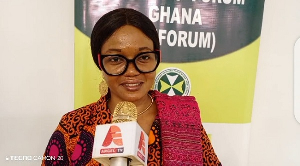 Debora Freeman speaking to the media at the event
Debora Freeman speaking to the media at the event
The Executive Secretary of The Informal Economy Workers’ Forum of Ghana (INFORUM), Debora Freeman, opined that the obvious segregation of societal roles that limit women to domestic duties is a barrier that hinders women's leadership positions in Ghanaian society.
Currently, INFORUM comprises over 5 million informal economy workers nationwide
comprising market women, traders, and seamstresses.
Mrs Debora Freeman said that at a conference in Accra on Thursday, September 5 2024 to launch research conducted by The Informal Economy Workers’ Forum of Ghana (INFORUM), and the Global Fairness Initiative (GFI) to encourage women to take leadership roles and to achieve better conditions for women in the informal sector.
According to her, the women’s population in Ghana outweighs that of the men, however, women have opportunities to become leaders in organizations and society hence, attributed this menace to a widely held view that women's only significant role is in the home.
She asserted that women are endowed with the potential to play leadership roles in recognized human settlements and occupations however, the individuals in authority hold the primitive sentiment that describes women as wives to assist with domestic choices.
Mrs. Debora Freeman lamented that women in the informal economy constitute 85% of the workforce in Africa but they live and work under harsh conditions.
She added that informal workers work long hours but earn little income, and they often live in environments where essential services namely safety and security, access to health care, and education are not guaranteed.
She further stated that limited education opportunities for Ghanaian women in the informal sector are the notable factors that explicitly render women less considered for appointment in the public sector, discouraging their roles as leaders.
To eradicate these barriers underlying gender inequality, she recommended that authorities design educational programmes to equip informal workers with the necessary technical and personal skills.
She admonished that unions and other interested parties should strengthen women's access to external funding and other resources required for company success and economic well-being, which, together with communication skills, is linked to leadership engagement and success.
“I enticed our women to unveil themselves as leading characters in societies and see ourselves as potential people who play the role of leaders. Let us discuss with our families when the opportunity presents itself,” she said.
The research dubbed “Women’s Voices and Leadership in Organizing Africa’s Informal Economy” has also drawn from a cross-country to include other partners from Rwanda, Cote d'Ivoire, Liberia, Tunisia, and South Africa.
Other attendants include Fédération des Travailleurs et Travailleuses de l’Economie Informelle du Côte d’Ivoire (FETTEI-CI), Petty Traders and Informal Workers Union of Liberia (FEPTIWUL), and South Africa Domestic Service and Allied Workers Union(SADSAWU).